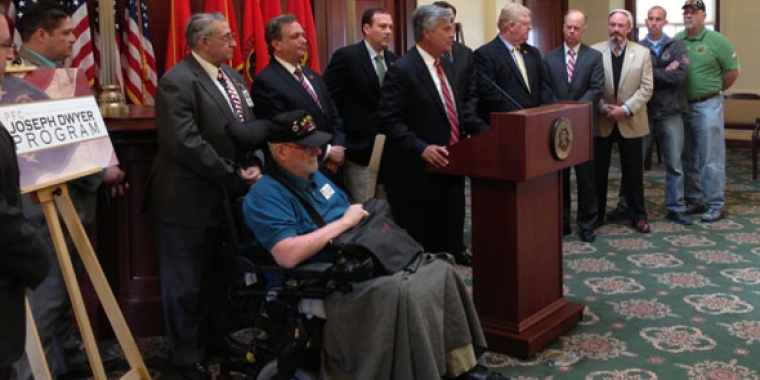
Senate Passes Mta Payroll Tax Repeal
Dean G. Skelos
June 15, 2011
Removing Payroll Tax Burden Will Help Businesses Create Jobs
The New York State Senate today passed legislation (S.5596A/ A.8193A) to repeal the MTA Payroll Tax, easing an enormous financial burden that has caused job losses and hurt businesses across the downstate region. The bill, which has strong support from business organizations including the Business Council of New York State and the National Federation of Independent Businesses, is sponsored by Senator Lee M. Zeldin (R, C, I- Shirley), Senator Jack Martins (R-C-I, Mineola) and other Senators representing the 12-county MTA region.
“I am very pleased to announce to my constituents, residents of Long Island and the rest of the 12-county MTA region that the state Senate has passed legislation to repeal the job-killing MTA Payroll Tax,” said Senator Zeldin. “There is absolutely no doubt that the MTA, without increasing fares or cutting services, can balance its books after this legislation is implemented. One must question the motives and veracity of any individual or group that attempts to dispute this fact going forward.”
Senator Zeldin and his co-sponsors Senator Martins, Senator Martin Golden (R-C, Brooklyn), Senator Greg Ball (R-C, Pawling), Senator John Bonacic (R-C-I, Mt. Hope), Senator Owen Johnson (R-C, Babylon), Senator William Larkin (R-C, Cornwall-on-Hudson), Senator Ken LaValle (R-C- I, Port Jefferson), Senator Stephen Saland (R-Poughkeepsie), Senator Charles Fuschillo (R, Merrick), Senator John Flanagan (R-C-I, East Northport), Senator Andrew Lanza (R-I, Staten Island), Senator Kemp Hannon (R-C-I, Garden City), Senator Carl Marcellino (R, Syosset) and Senate Majority Leader Dean G. Skelos (R, Rockville Centre), introduced this legislation to repeal the job killing MTA Payroll Tax after hearing from countless constituents about how the tax has harmed businesses and how repealing it could help businesses invest, expand and create new jobs.
“The MTA payroll tax has been an anchor holding back economic growth and job creation,” Senator Skelos said. “Every Senate Republican voted against it, we have heard from our constituents who want it repealed and we have now passed a bill to phase it out. I applaud Senator Zeldin for his leadership on this issue and I hope the Assembly will join us in passing it.”
The phase-out would begin on January 1, 2012, by exempting small businesses of 25 employees or less, as well as public and non-public schools. The tax would be fully phased out by January 1, 2014 for the seven suburban counties outside of New York City. Within the five boroughs of New York City, the tax would be phased down to .21 percent and would remain at that level. The bill includes several provisions to provide the MTA with $465 million in revenues by 2014 to significantly offset revenues lost due to the significant reduction and repeal of the payroll tax, leaving $375 million, or about three percent of the overall MTA budget, for the MTA to absorb.
Senator Golden, a member of the MTA Capital Program Review Board, stated, “The Transit Funding Lockbox is necessary simply because we must stop the reallocation of funds within our state budget originally dedicated to our transportation system. This legislation approved by the state Senate is designed to guard all who travel by public transportation from a pattern of having to pay more for less service. Now, knowing that these funds are not going to disappear from their budget, the MTA can better plan to meet the needs of the commuters of the City and State of New York."
"The MTA payroll tax should never have been enacted. As long as it remains in effect, it continues to hurt our businesses, not-for-profits, schools and local governments,” Senator Martins said. “I am proud to co-sponsor the legislation to repeal this onerous tax as another measure to get our economy back on track. Eliminating the MTA payroll tax will put more money back into Long Island's economy so we can create jobs and give people further tax relief."
“When their well was dry, the MTA put their hand out for more and the Democrats leading the state filled it back up by imposing a job killing payroll tax and raising our DMV fees. I have fought this tax since its inception and will continue the fight until its repealed,” said Senator Steve Saland (R-I-C, Poughkeepsie).
“It’s time for the MTA to stop balancing its budget on the backs of hard-working New Yorkers,” said Senator Greg Ball. “This is a tax that has literally cost hundreds of jobs and destroyed the dreams of dozens of business owners. Homeowners throughout this great state have been forced to tighten the belt and trim the fat in order to make ends meet. It’s irresponsible and unacceptable that an agency like the MTA has not done the same,” added Ball.
“The MTA payroll tax has been devastating for Staten Island’s families, businesses, not-for-profits, and schools,” said Senator Andrew Lanza. I voted against this tax in 2009 because the MTA consistently comes to the taxpayers of this state with their hands out and then hikes fares and cut services. It is time that we repeal this job killing tax.”
Senator John Bonacic said, "The MTA payroll tax is taxation without transportation. It was an example of one-party government at its worst. Today, the Senate passed a repeal of that tax. We urge the Assembly Democrats who voted against the tax - who keep pledging their loyalty to Assembly Speaker Silver, to stand up, show some independence, and demand he bring this or any other MTA repeal plan to the floor for a vote."
"This legislation is long overdue," said Senator Bill Larkin (R-C, Cornwall-on-Hudson). "The economy of the Hudson Valley has been strangled by this onerous and burdensome tax and phasing it out is the first step towards encouraging economic development and job growth. We must provide businesses with the means to expand in New York, not give them reasons to leave. I applaud Senator Zeldin for his work on this issue and look forward to the Governor signing the bill into law."
"Repealing the MTA payroll tax is essential to getting New York State and Long Island back on the right track for economic prosperity. The payroll tax, which I voted against, has devastated businesses, municipalities, non-profits, and schools. The Senate's passage of this legislation is the first step in repealing this burdensome tax. The Assembly should join the Senate in approving this legislation," said Senator Fuschillo, Chairman of the Senate's Transportation Committee.
“The job-killing MTA payroll tax was ill conceived and is onerous. I voted against it when it was introduced by the Democrat majority and will vigorously support and work for its repeal,” Senator Kenneth LaValle (R-C-I, Port Jefferson) said.
“When I voted against the $1.8 billion MTA bailout plan and the egregious MTA payroll tax in May 2009, I said repeatedly this was an unjust attempt to drive up costs for commuters while doing nothing to reform the wasteful spending of the MTA. I find this tax to be completely unacceptable and support its repeal,” Senator Kemp Hannon said.
“The payroll tax has devastating effects on our schools, businesses, not-for-profits, hospitals, and municipalities in the MTA region. This tax has caused businesses to lay off workers and has effectively prevented the economy from any meaningful recovery. I have said from the day I voted against it, that the Payroll Tax is a burdensome, job killing tax that should never have been adopted in the first place,” said Senator Carl L. Marcellino.
“This legislation eliminates the MTA payroll tax and provides a reasonable funding source to replace it,” Senator Owen H. Johnson said. “Our small businesses, not-for-profit organizations, libraries, municipalities and schools would not suffer from the onerous MTA tax, and our commuters would not be deprived of services they so badly need. I commend Senator Zeldin and his efforts to address and remove this unfair and job killing tax.”
“By repealing the ill-conceived MTA Payroll Tax, we will be doing more than just protecting our business community. We will be helping create jobs for our residents, helping our not-for-profits survive and helping our tax base grow. And at a time when our economy is struggling to recover, these are all steps that will help our state and our nation move forward,” stated Senator Flanagan.
The legislation is supported by the National Federation of Independent Businesses, The Business Council of New York State, Inc., The Long Island Business News, New York Farm Bureau, GrowPAC, The Empire State Chapter of the Associated Builders and Contractors, Long Island Cares, Inc., The Long Island Business Council, New York State Catholic Conference, the Nassau-Suffolk Hospital Council, Tax Relief Now, the Hauppauge Industrial Association, and several Chambers of Commerce.
The bill was sent to the Assembly where it is sponsored by Assemblyman George Latimer (D-Rye).
Summary of Legislation
Small businesses with 25 employees or less, as well as public and non-public schools throughout the entire Metropolitan Commuter Transportation District (MCTD), would be completely exempted from the payroll tax as of January 1, 2012.
The payroll tax, for the seven suburban counties within the MCTD, beginning on January 1, 2012, will have tax rates reduced to 0.23 percent. The tax will be further reduced to 0.12 percent for 2013 and fully repealed as of January 1, 2014. These counties include Suffolk, Nassau, Westchester, Rockland, Orange, Putnam and Dutchess.
Within New York City’s five boroughs, the tax would be reduced to 0.28 percent on January 1, 2013 and 0.21 percent beginning on January 1, 2014. The payroll tax would remain in effect at the 0.21 percent rate for New York City’s five boroughs.
This legislation also includes several measures to mitigate the immediate fiscal impact of the PMT phase-out on the MTA’s operating budget and in order to provide the MTA with the opportunity to implement greater operating efficiencies. These mitigation measures will result in the MTA having to absorb only $375.6 million in foregone PMT revenue by 2014, a tiny 2.4 percent of the expected $15 billion MTA operating budget.
These measures include:
· Direct up to $100 million Regional Greenhouse Gas Initiative (RGGI) funds collected within the MCTD to the MTA.
· Eliminate the PMT for public and non-public schools and state savings from the PMT reduction.
· Prohibit the use of transit funds for state General Fund relief and other purposes.
· Restore a portion of the New York City revenue sharing in SFY 2014-15 and have it dedicated to the MTA for New York City transit purposes.
· Dedicate a portion of the state sales tax on gasoline to transportation including transit and the Dedicated Highway and Bridge Trust Fund, which supports Department of Transportation capital spending.
Share this Article or Press Release
Newsroom
Go to Newsroom
Senate Passes Public Safety Legislation
April 23, 2013
Senate Passes Bill to Increase Juror Safety
April 15, 2013